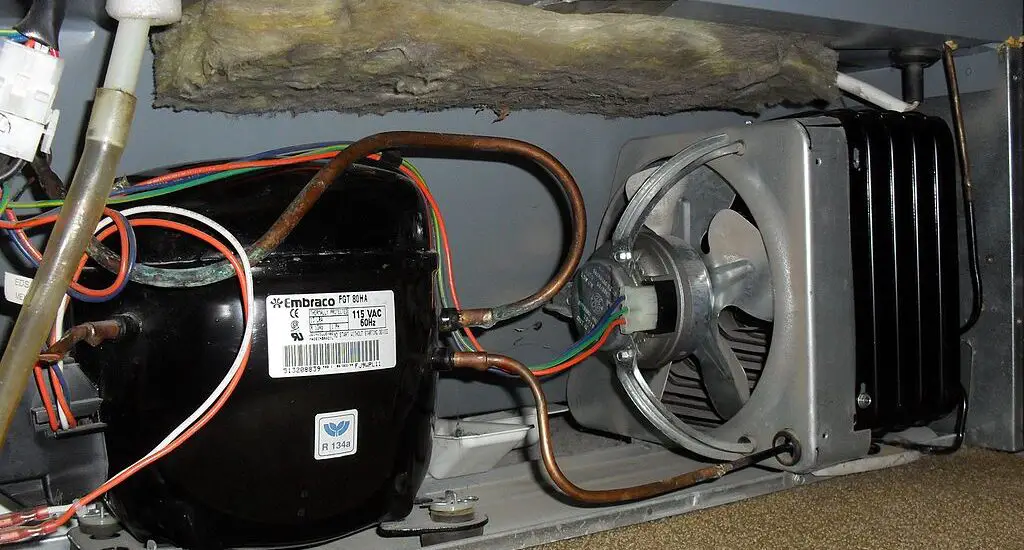You got a refrigerator compressor drawing high amps? Alright, let’s get this sorted out. This article is a one-stop-shop for everything you need to understand about why this is happening, and how you can fix it. Buckle up!

Table of Contents
Understanding the Role of a Refrigerator Compressor
First off, what’s this compressor we’re talking about? A refrigerator compressor is the heart of your fridge, folks. It’s that important part that keeps your food cool by circulating refrigerant through the evaporator and condenser coils.
What is a Compressor?
Think of the compressor as the heart of your refrigerator. It keeps everything cool and fresh. It’s like the engine that keeps your car running but for your fridge!
How Does a Compressor Work?
The compressor works like a magic trick – it compresses the refrigerant, turning it from a gas to a liquid, and pumps it around the refrigerator. Fancy, right? It’s basically what makes your fridge cold.
Compressor and Power Consumption
Now, onto the big question. Why is it a problem if the compressor is drawing high amps? Well, the compressor, being the heart of the fridge, consumes a good chunk of your fridge’s power. When it’s working harder than it should, it’s like your fridge is running a marathon every day. Needless to say, this isn’t good for your electricity bill!
Reasons Why Your Refrigerator Compressor is Drawing High Amps
Think your fridge is working harder than it should? Well, there might be a few reasons for that. When it comes to a refrigerator compressor drawing high amps, it’s like your fridge is powerlifting when it should be simply jogging. Let’s delve into some common reasons this might happen.
Faulty Capacitor
A capacitor, in your refrigerator? You bet! This tiny component has a significant role in how your fridge operates. It gives that initial push to your compressor, kind of like a nudge to get it running. If it’s faulty, it can cause the compressor to draw more power, struggling to kick off its operation.
How to Detect a Faulty Capacitor
So how do you know if your capacitor has gone on holiday? A multimeter is your best friend here. Testing the capacitor with a multimeter can tell you if it’s working as it should or if it’s time to get a new one. Remember, safety first. If you’re not comfortable dealing with electrical components, it’s best to get a professional to do it.
Overloaded Compressor
An overloaded compressor is like a runner with weights tied to their feet. Too much stuff inside the fridge, wrong temperature settings, or a blocked condenser coil could be making your compressor work overtime, leading to a high amp draw. It’s like forcing your fridge to run a marathon, every day, without rest.
Signs of an Overloaded Compressor
How can you tell if your compressor is overloaded? Well, if your fridge is hotter than usual on the outside, or if it’s running non-stop, or if you can hear a humming sound more frequently than before, chances are your compressor might be overloaded.
Old and Inefficient Compressor
Even a refrigerator gets old, and just like us, as it ages, it becomes less efficient. An old compressor might struggle to keep up, like a tired athlete, and end up drawing more power.
When to Consider Replacing Your Compressor
So when do you say goodbye to your old compressor? Well, if your fridge is over ten years old, and you’ve noticed that it’s constantly running or not cooling as efficiently as before, it might be time to think about getting a new compressor.
External Factors Contributing to High Amp Draw
And then there are those factors that we often overlook. Your fridge doesn’t exist in a bubble. Its surroundings matter. Ambient temperature, the refrigerator’s location, or even how often the door is being opened and closed can affect the compressor’s power consumption.
Check out these other related articles…
Fridge Compressor Tripping: Causes, Solutions & Prevention
How to Repair Refrigerator Compressor: Simple DIY Fixes
Fridge Compressor Loud Hum: Causes & Fixes
Refrigerator Compressor Low Amp Draw: What You Need to Know
Fridge Compressor Jammed: Causes & Fixes
How to Fix a Refrigerator Compressor Drawing High Amps
Now that we know what might be causing your fridge’s workout, let’s figure out how to get it back in shape.
Checking and Replacing a Faulty Capacitor
If you’ve found your capacitor to be the culprit, replacing it should do the trick. It’s relatively simple to do, but if dealing with electrical components is not your cup of tea, getting a professional involved would be a good idea.
Relieving an Overloaded Compressor
What can you do about an overloaded compressor? Start with the basics. Adjust the temperature settings, make sure you’re not overstuffing your fridge, and clean the condenser coils. A little care can go a long way.
Replacing an Old and Inefficient Compressor
If your compressor is old and simply not up to the task anymore, it might be time to replace it. It’s a big job and typically something for a professional to handle. But, once it’s done, your fridge will run like it’s brand new again, and your energy bills will thank you.
Adjusting External Factors
Remember, your fridge doesn’t live in a bubble. Think about where it’s placed, how often you’re opening and closing the door, and what the room temperature is. These little things might not seem like much, but they can make a huge difference to your compressor’s amp draw.
